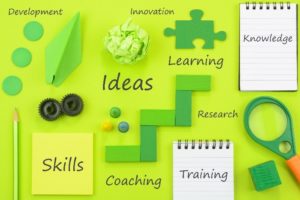
When we’re students, the start of the school year gives us an opportunity to learn new things and grow. Yet as we move into adulthood, one year begins to blend into another. Confronted with daily demands, we tend to rely on past successes and past knowledge alone. Pretty soon we’re just going through the motions. We become stagnant; we don’t grow.
This trend is especially troublesome for leaders, because once you are stagnant—or even perceived as stagnant—your influence erodes. As my friend Norman Vincent Peale used to say, “Once you stop learning and growing, you might as well lie down and let them throw dirt on you, because you’re already dead!”
A Four-Part Plan to GROW
In our book Great Leaders GROW, Mark Miller and I contend that the best leaders make a conscious decision to grow throughout their careers and their lives. In the book, we outline four key practices that lead to the development of your highest potential, both on and off the job.
G Stands for Gaining Knowledge
Gaining knowledge isn’t something you do once and stop doing when you get a degree. It is a long-term decision—a habit, actually—to nurture and develop through the years. You can work on gaining knowledge in these areas:
- Self-knowledge – The better you know yourself, the better you’ll understand how you’re perceived and how you make decisions. To gain insight into your personality, check out assessments like the Myers-Briggs Type Indicator, the DiSC Profile, or StrengthsFinder.
- Knowledge of others – The more you know about others, the easier it is to work with them to attain mutual goals. Go beyond superficial conversations and really get to know the people you work with.
- Knowledge of your industry – Read up on the history of your industry. Research what’s happening in your field today. Who are the major players? What do they offer? Where is the industry headed?
- Knowledge of the field of leadership – Keep reading business books, blogs, and newsletters to learn new leadership trends and best practices. What skills do other leaders have that you might need to work on?
R Stands for Reaching Out to Others
Reaching out to others and sharing what you’ve learned accelerates your own growth. You can do this formally by using your expertise to:
- Lead a seminar.
- Sit on a panel at a professional conference.
- Become a mentor to someone in your field.
Or you can take an informal approach by making a conscious effort to:
- Seize on teachable moments.
- Share what you’re learning with others.
- Tell stories that convey lessons you’ve learned.
O Stands for Opening Your World
Opening your world is a little tricky during a pandemic, but you won’t grow unless you expand your mind through new experiences that light a spark within you. Thanks to technology, many of the following examples can be done virtually.
Here are things you can do to open your world at work:
- Attend training events to broaden your perspective.
- Interview recent retirees and seek their counsel on current issues.
- Have lunch with someone different every day to expand your network.
- Lead any kind of a team or group. Leaders are learners!
You can do the following activities to open your world outside of work:
- Travel—anywhere—when it’s safe to do so.
- Volunteer regularly—anywhere.
- Learn a foreign language.
- Visit virtual museums or attend virtual plays or concerts.
A balance between stimulating work experiences and fulfilling personal experiences is essential if you are going to keep growing.
W Stands for Walking toward Wisdom
Wisdom can be defined as the application of accumulated knowledge and experience. Contrary to what you might think, wisdom has nothing to do with age. We all have known younger people who might be described as “wise beyond their years,” and many of us can say we know a few “old fools.”
The pursuit of wisdom never ends for those who aspire to leadership. Your journey toward wisdom should include the following elements:
- Self Evaluation. Look in the mirror and be truthful with yourself.
- Honest Feedback. Ask those around you for feedback on how you are doing.
- Counsel from Others. Learn from others’ experiences as you move forward.
- Time. Understand that acquiring wisdom is a lifelong process and can’t be rushed.
Your capacity to lead is determined by your capacity to grow—and the fastest way to grow is to learn. As we head into the fall, challenge yourself. Set new goals and sign up for training. Keep learning and keep growing. Make it a habit, and you’ll enjoy the benefits of becoming a leader for life.